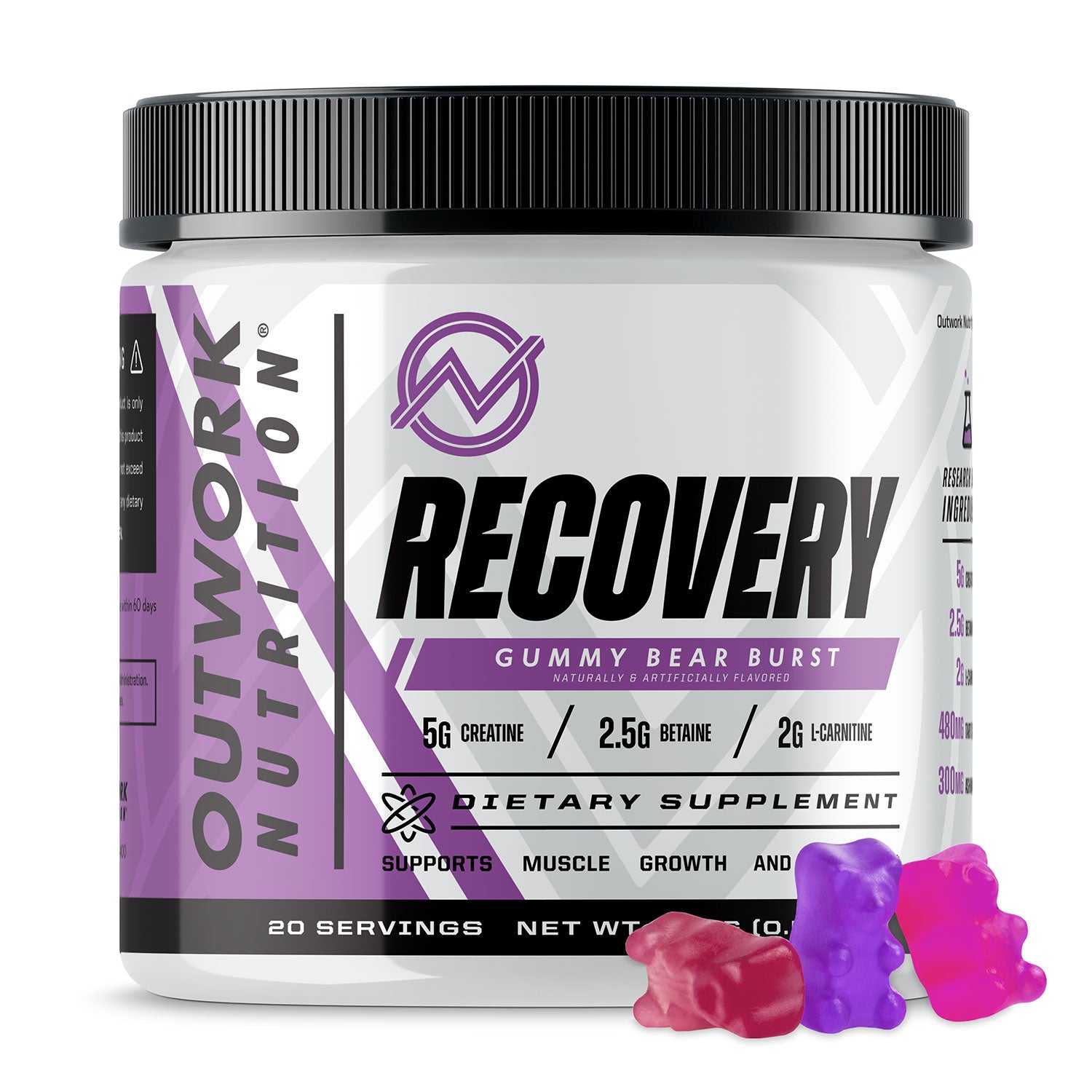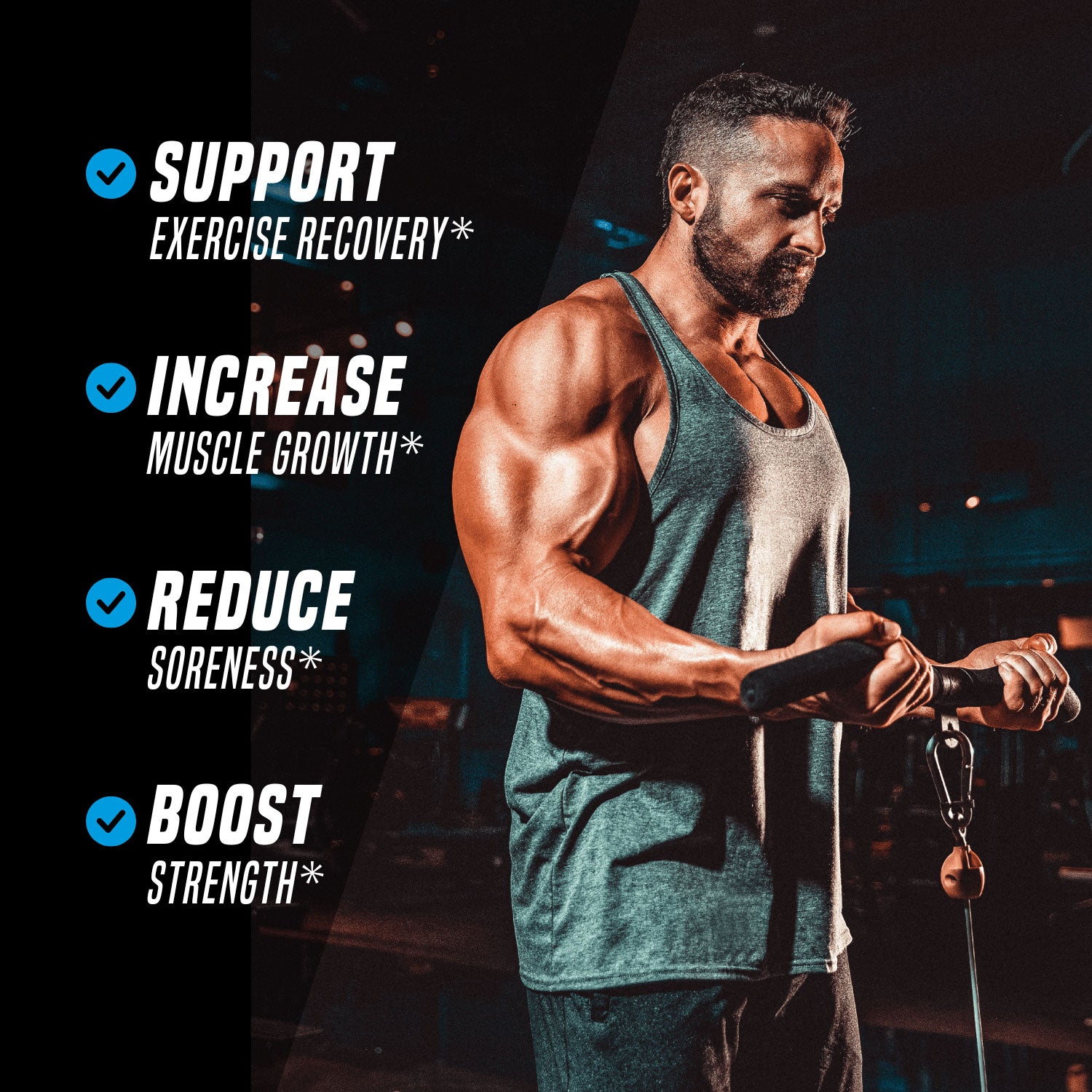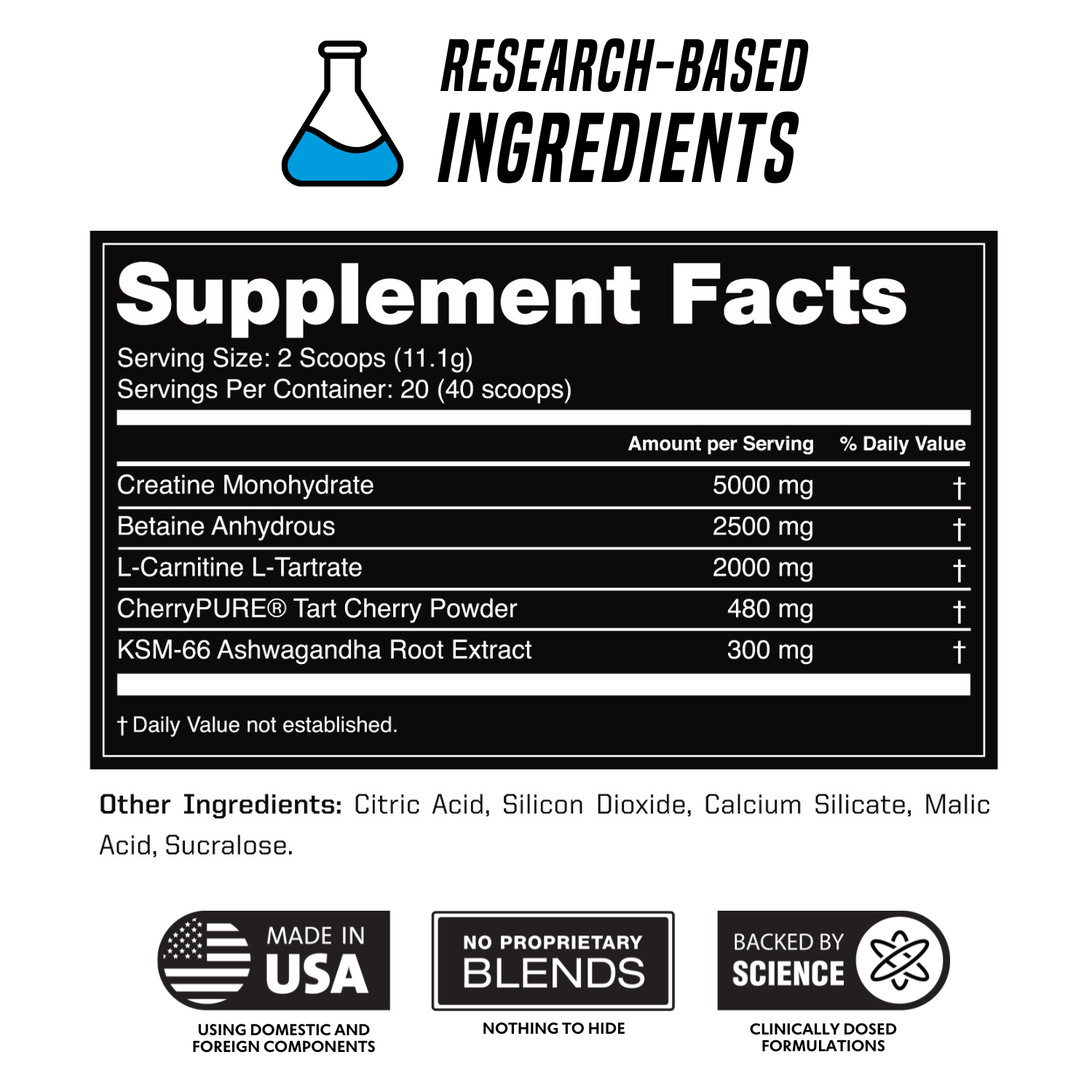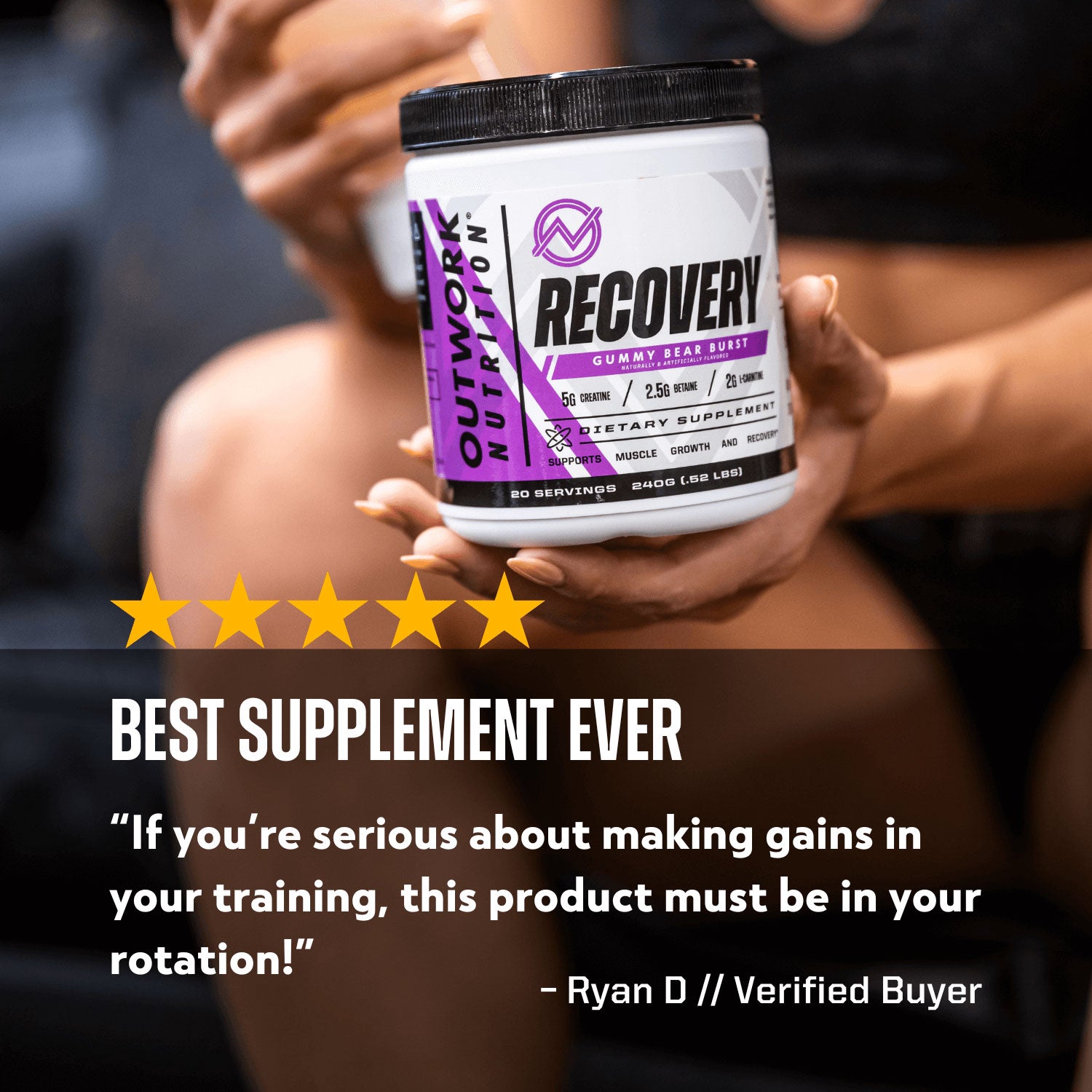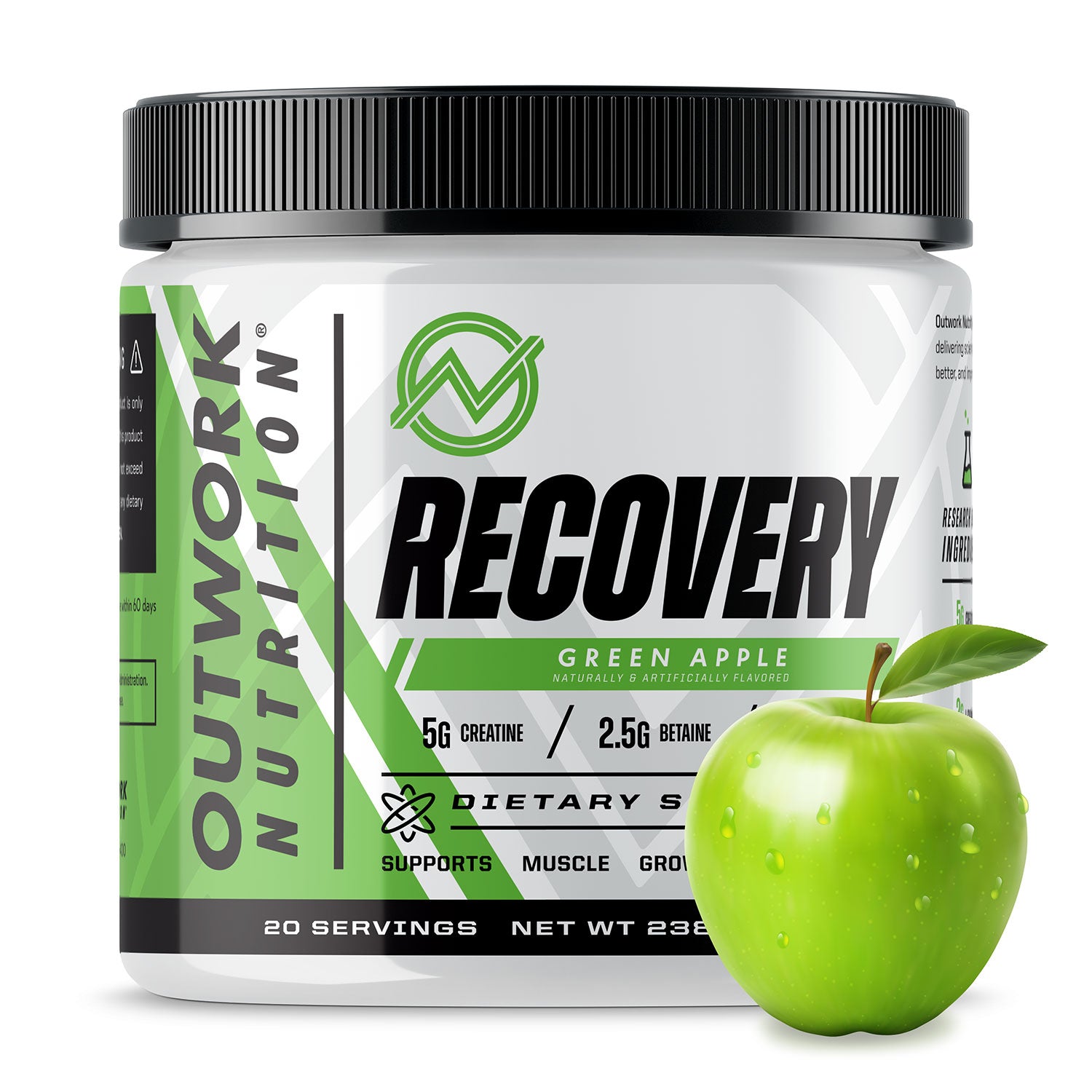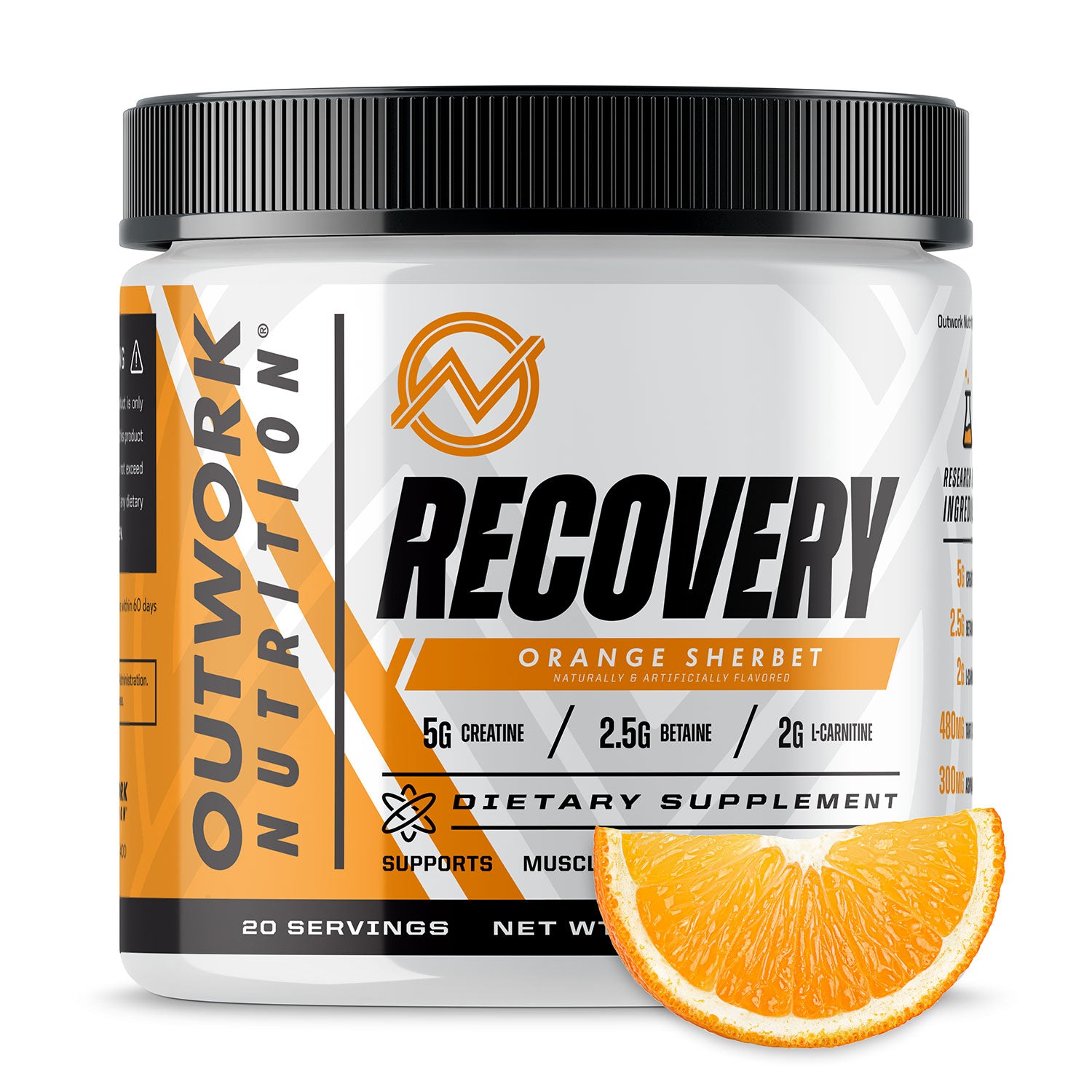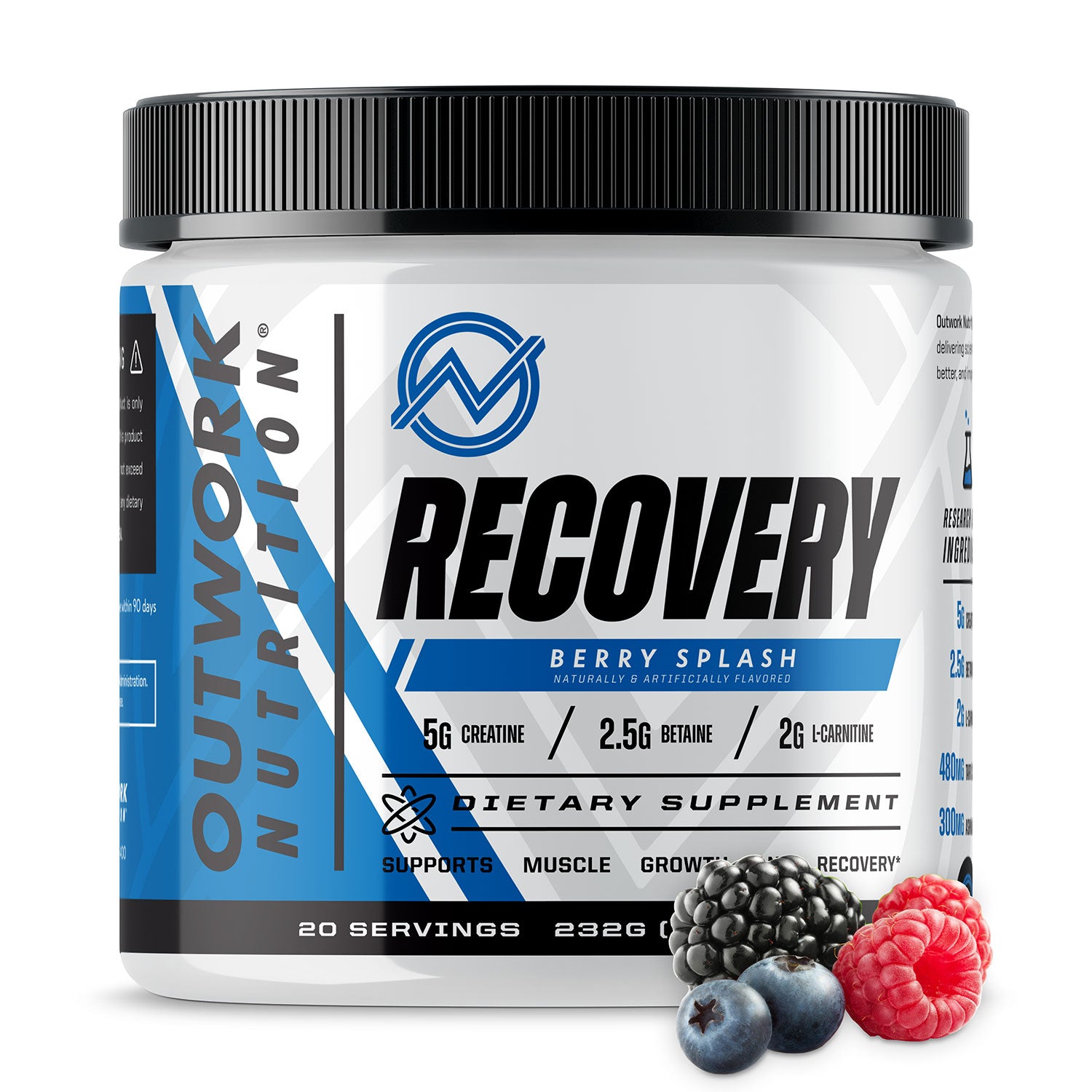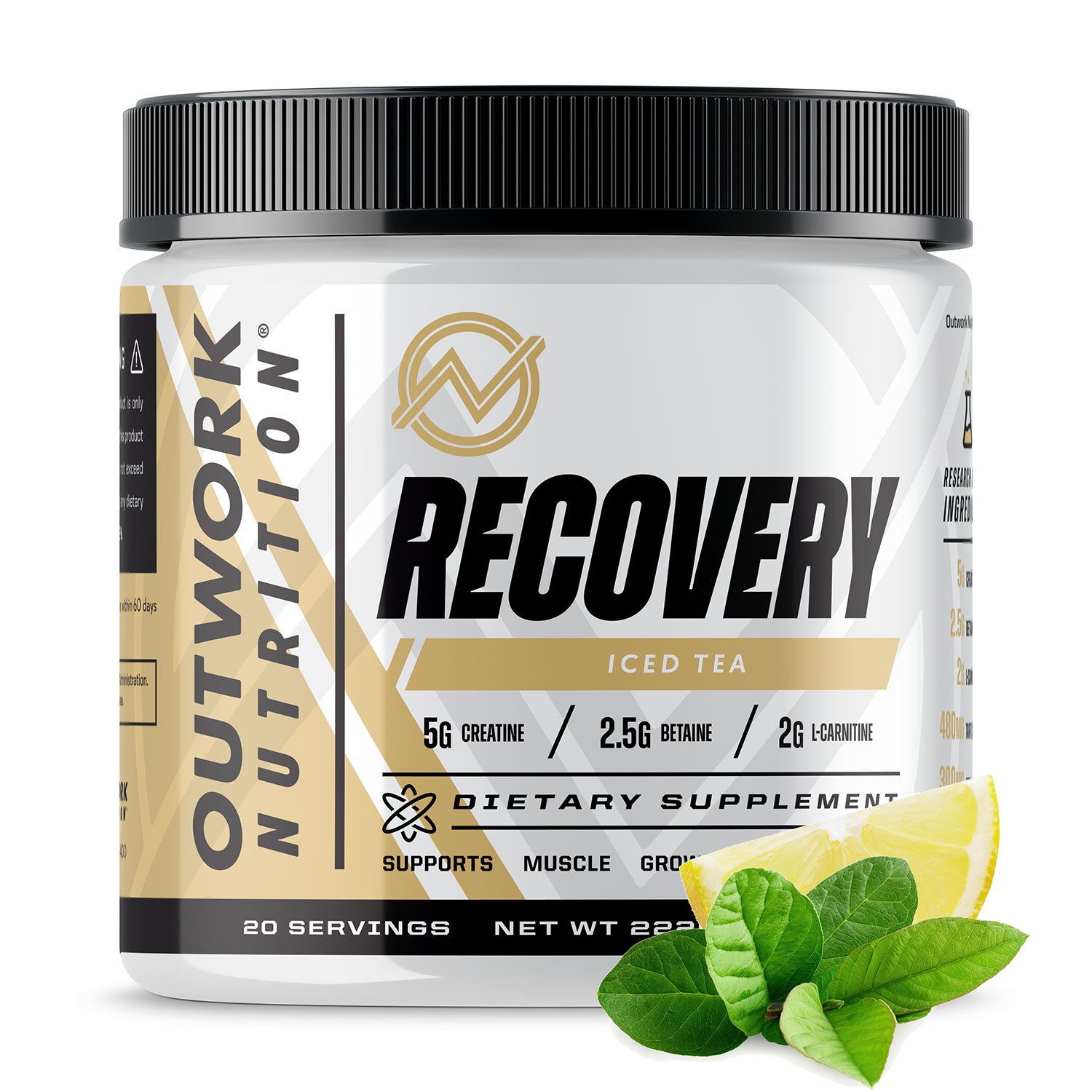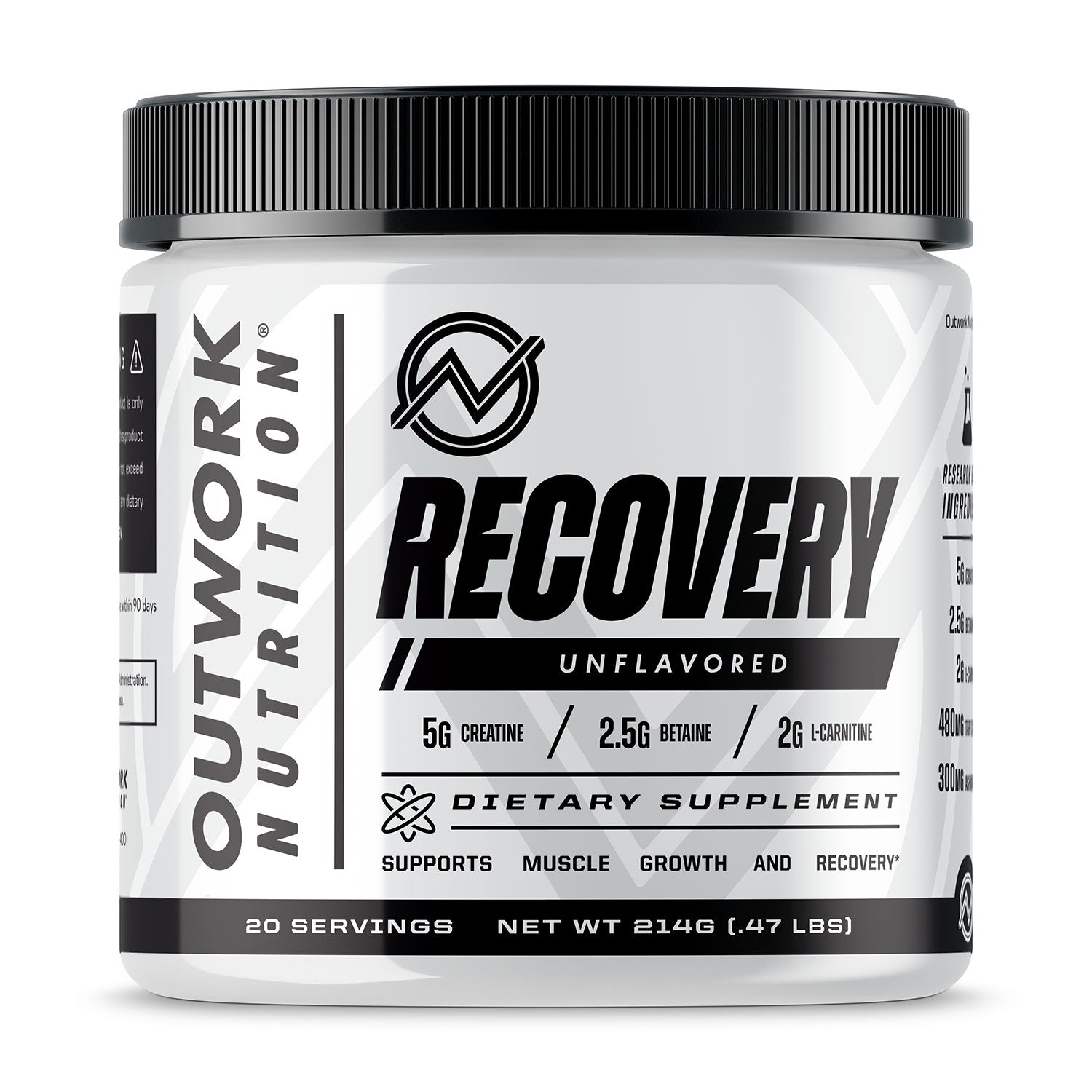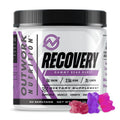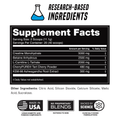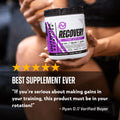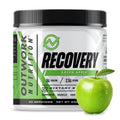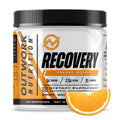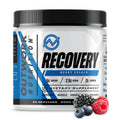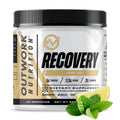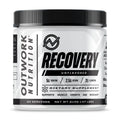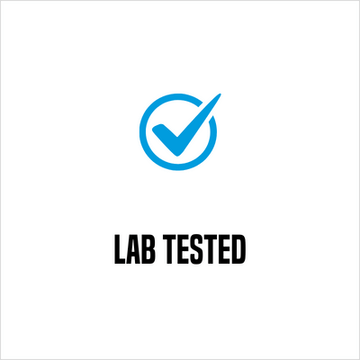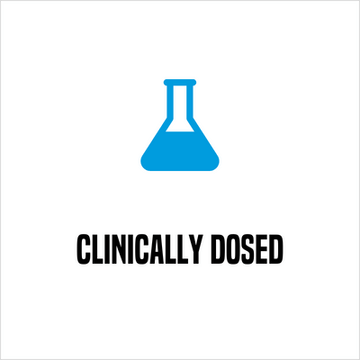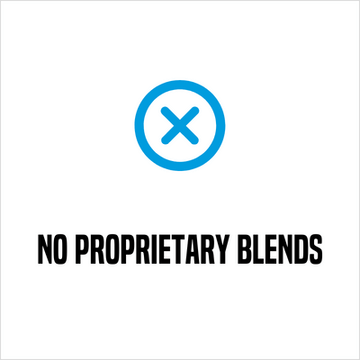Recovery
-
Free Shipping on all US orders over $99
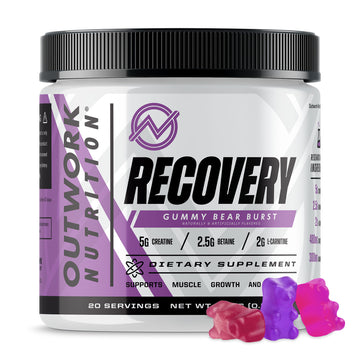
Recovery
Get the most effective post-workout powder. It has 5 powerful ingredients backed by science. They will help you recover from hard training and build muscle.*
- Evidence-based formulation with proper doses.
- No proprietary blends, no unfamiliar ingredients, and no bogus claims.
- Lab tested, made in the USA, and 100% money-back satisfaction guarantee.
Effective Post-Workout Powder
Outwork Recovery provides an evidence-based formula that will help you recover faster and build more muscle.* It doesn’t include low-dosed, throwaway ingredients with little research to back up their claims, or seemingly novel ingredients included simply to make the product appear innovative. Each ingredient serves a specific purpose (to make the best post-workout powder), and each one is fully disclosed on the label - nothing is hidden behind a proprietary blend.
Outwork Recovery is also formulated to work synergistically with Outwork Pre-Workout. While both work well as standalone products, they work even better together due to complementary ingredients and effects.
Outwork Recovery can help:
- Increase lean body mass*
- Improve recovery from workouts*
- Increase muscle protein synthesis and net muscle protein balance to help you build more muscle mass*
- Decrease excessive muscle damage*
- Reduce delayed onset muscle soreness (DOMS) so you can get back in the gym*
- Increase androgen receptor density in muscle cells, making your current levels of anabolic hormones like testosterone more effective*
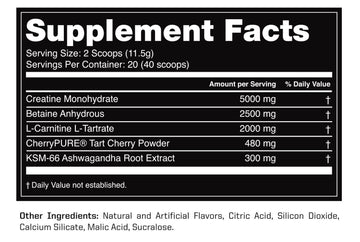
How To Use
As a dietary supplement, mix 2 scoops with 12-24oz of water. New users should start with 1 scoop to assess tolerance. Consume at least 5 days per week with food or after a meal.
Many people use Recovery as a post-workout powder. However, timing is not important – it can be taken anytime that is convenient.
Recovery Ingredients
Creatine Monohydrate (5g per serving)
Creatine is a naturally occurring molecule that is synthesized in the liver and its benefits are well-documented. Creatine supplementation has been shown to increase muscle strength, and performance output [1][2] as well as improve body composition and lean body mass [3][5]. Additionally, creatine aids in recovery by delaying the onset of muscle fatigue [2]. While there are many different forms of creatine on the market, the overwhelming amount of research showing benefits of creatine supplementation has been performed using creatine monohydrate [4][5][6]. Studies on creatine monohydrate supplementation have shown that 5-10 g/d are optimal in maintaining whole body creatine stores [1][8] and that doses as high as 30 g/d for five years is generally safe and well tolerated [7]. Additionally, a dosing of 3 g/d of creatine monohydrate throughout the lifespan may delay or prevent the onset of health problems such as type II diabetes, obesity and metabolic syndrome [7][12].
The research data overwhelmingly show that creatine monohydrate is safe and effective. Other forms of creatine (ethyl ester, buffered creatine, hydrochloride, etc) are either less effective or of equal effectiveness but more expensive [9][10][11]. Creatine monohydrate has been demonstrated to saturate the muscle cell with phosphocreatine and has by far the most scientific data to support its usage [11]. Therefore, Outwork Recovery ensures that you are getting the best bang for your buck with a full dose of 5g per serving [1][8].
Betaine (2.5g per serving)
Betaine is a nutrient isolated from beets and found in a variety of animals, plants and microorganisms. In the human body, betaine is a highly effective osmolyte which helps to enhance muscle cell survival, increase cell synthesis, and maintain myosin ATPase activity during periods of stress [13].
Betaine supplementation has been demonstrated to improve strength and peak power output [14][15]. Betaine also increases endurance by extending the time until fatigue and protecting the body from dehydration [13][15]. Lastly, betaine supplementation has been shown to increase lean body mass [16][17]. With a research supported dose of 2.5 g of betaine per serving, Outwork Recovery post-workout helps to ensure that you get the best results from your workouts [13][14][15].
L-Carnitine L-Tartrate (2g per serving)
L-carnitine L-tartrate (LCLT) is a dietary supplement containing the levo-enantiomers of carnitine and tartrate [18]. LCLT supplementation may improve workout performance, but it has also demonstrated the ability to enhance recovery [21]. LCLT has been shown to improve blood flow and the delivery of oxygen to muscle tissue during and after exercise [19]. Additionally, LCLT may reduce muscle soreness [20][22], increase androgen receptor density in muscle cells [23] and increase lean body mass in the elderly [24]
Outwork Recovery provides a full dose of 2g of LCLT to reduce the post exercise muscle soreness and enhance time to recovery.*
Tart Cherry Extract (480mg per serving)
Montmorency tart cherries are extremely rich in anthocyanins, a major polyphenolic sub-class of flavonoids. Anthocyanins are also powerful antioxidants and help regulate metabolic dysfunction within the human body [25]. The high concentration of anthocyanins in Tart Cherry Extract reduces oxidative stress and inflammation which may improve workout recovery [25][26][27][28] Further, supplementation with Tart Cherry Extract has been demonstrated to decrease delayed onset muscle soreness during resistance training, thus improving recovery [29].
Outwork Recovery post-workout powder provides a full dose of 480 mg tart cherry extract powder to bring all the benefits and help you recover faster [25][26].
Ashwagandha (300mg per serving)
Ashwagandha is an adaptogenic herb also known as Indian Ginseng or Winter Cherry [30]. Adaptogens are compounds with phytonutrients that help to regulate the body’s metabolism in times of physical or mental stress. They help by normalizing system functions, building a resistance to future stress, and elevating the ability to function at a higher performance level [30].
Ashwagandha has gained significant interest in the exercise science realm for its ability to increase lean body mass, strength and recovery [30]. It has also been shown to improve mental well-being [31], reduce stress and anxiety [32], improve sleep quality [32] and increase testosterone levels [33].
Recovery FAQ
How do I use Recovery?
Mix with 12-24 ounces of water (to taste) and drink anytime that is convenient.
New users should start with a half serving (1 scoop) to assess individual tolerance. If you experience any non-optimum effects, stop and consult your doctor.
For sensitive individuals, we recommend taking Recovery with food or after a meal to avoid any gastrointestinal issues.
If 1 scoop is well tolerated and you want the full clinically effective dose of Recovery, mix 2 scoops into 12-24 ounces of water and drink anytime.
When should I take Recovery?
Although it is known as a "post-workout drink", Recovery is really not timing-dependent. You may use it anytime that is convenient. The effects are cumulative, so taking it consistently is the most important part.
We recommend taking Recovery at least 5 days per week, including rest days. You can use it everyday if you want to.
For sensitive individuals, we recommend drinking Recovery with food or after a meal on a full stomach to avoid any gastrointestinal issues.
Is Recovery gluten-free, vegetarian, or vegan?
Yes, Outwork Recovery is gluten-free, vegetarian, and vegan.
Scientific References
01
Shao, A and Hathcock, JN. Risk assessment for creatine monohydrate. Regul Toxicol Pharmacol 45: 242-251, 2006.
02
Herda TJ, Beck TW, Ryan ED, et al. Effects of creatine monohydrate and polyethylene glycosylated creatine supplementation on muscular strength, endurance, and power output. Journal of Strength and Conditioning Research. 2009;23(3):818-26.
03
Rawson, E.S., Volek, J.S. (2003). Effects of creatine supplementation and resistance training on muscle strength and weightlifting performance. Journal of Strength & Conditioning Research,17, 822–831.
04
Candow DG, Vogt E, Johannsmeyer S, Forbes SC, Farthing JP. Strategic creatine supplementation and resistance training in healthy older adults. Appl Physiol Nutr Metab. 2015 Jul;40(7):689-94.
05
Stone MH1, Sanborn K, Smith LL, O’Bryant HS, Hoke T, Utter AC, Johnson RL, Boros R, Hruby J, Pierce KC, Stone ME, Garner B. Effects of in-season (5 weeks) creatine and pyruvate supplementation on anaerobic performance and body composition in American football players. Int J Sport Nutr. 1999 Jun;9(2):146-65.
06
Francaux M1, Demeure R, Goudemant JF, Poortmans JR. Effect of exogenous creatine supplementation on muscle PCr metabolism. Int J Sports Med. 2000 Feb;21(2):139-45.
07
Kreider, R.B., Kalman, D.S., Antonio, J. et al. International Society of Sports Nutrition position stand: safety and efficacy of creatine supplementation in exercise, sport, and medicine. J Int Soc Sports Nutr 14, 18 (2017).
08
Kreider RB, et al. Long-term creatine supplementation does not significantly affect clinical markers of health in athletes. Mol Cell Biochem. 2003;244(1–2):95–104.
09
Spillane M, Schoch R, Cooke M, et al. The effects of creatine ethyl ester supplementation combined with heavy resistance training on body composition, muscle performance, and serum and muscle creatine levels. J Int Soc Sports Nutr. 2009;6:6. Published 2009 Feb 19. doi:10.1186/1550-2783-6-6
10
Jagim AR, Oliver JM, Sanchez A, et al. A buffered form of creatine does not promote greater changes in muscle creatine content, body composition, or training adaptations than creatine monohydrate. J Int Soc Sports Nutr. 2012;9(1):43. Published 2012 Sep 13. doi:10.1186/1550-2783-9-43
11
Cooper R, Naclerio F, Allgrove J, Jimenez A. Creatine supplementation with specific view to exercise/sports performance: an update. J Int Soc Sports Nutr. 2012;9(1):33. Published 2012 Jul 20. doi:10.1186/1550-2783-9-33
12
Gualano B, Novaes RB, Artioli GG, Freire TO, Coelho DF, Scagliusi FB, Rogeri PS, Roschel H, Ugrinowitsch C, Lancha AH., Jr Effects of creatine supplementation on glucose tolerance and insulin sensitivity in sedentary healthy males undergoing aerobic training. Amino Acids. 2008;34:245–250.
13
Pryor JL, Craig SAS, Swensen T. Effect of betaine supplementation on cycling sprint performance. Journal of the International Society of Sports Nutrition. 2012;9.
14
Lee EC, Maresh CM, Kraemer WJ, Yamamoto LM, Hatfield DL, Bailey BL, Armstrong LE, Volek JS, McDermott BP, Craig SA: Ergogenic effects of betaine supplementation on strength and power performance. J Int Soc Sports Nutr 2010, 7:27.
15
Hoffman JR, Ratamess NA, Kang J, Rashti SL, Faigenbaum AD: Effect of betaine supplementation on power performance and fatigue. J Int Soc Sports Nutr 2009, 6:7.
16
Cholewa JM1, Guimarães-Ferreira L, Zanchi NE. Amino Acids. Effects of betaine on performance and body composition: a review of recent findings and potential mechanisms. 2014 Aug;46(8):1785-93.
17
Cholewa JM, Guimarães-Ferreira L, Zanchi NE. Effects of betaine on performance and body composition: a review of recent findings and potential mechanisms. Amino Acids. 2014 Aug;46(8):1785-93.
18
National Center for Biotechnology Information. "PubChem Compound Summary for CID 76964373, Levocarnitine tartrate" PubChem, https://pubchem.ncbi.nlm.nih.gov/compound/Levocarnitine-tartrate. Accessed 21 June, 2024.
19
Kraemer, WJ, Volek, JS, Spiering, BA, and Vingren, JL. L-Carnitine supplementation: a new paradigm for its role in exercise. Chemical Monthly 136: 1383-1390, 2005.
20
Spiering BA, Kraemer WJ, Vingren JL, Hatfield DL, al e. Responses of criterion variables to different supplemental doses of l-carnitine l-tartrate. Journal of Strength and Conditioning Research. 2007;21(1):259-64.
21
Kraemer, WJ, Volek, JS, French, DN, Rubin, MR, Sharman, MJ, Gómez, AL, Ratamess, NA, Newton, RU, Jemiolo, B, Craig, BW, and Häkkinen, K. The effects of L-carnitine L-tartrate supplementation on hormonal responses to resistance exercise and recovery J. Strength Cond. Res. 17:455-462. 2003.
22
Parandak, Khadijeh et al. “The effect of two-week L-carnitine supplementation on exercise -induced oxidative stress and muscle damage.”Asian journal of sports medicinevol. 5,2 (2014): 123-8.
23
Kraemer WJ, Spiering BA, Volek JS, Ratamess NA, Sharman MJ, Rubin MR, French DN, Silvestre R, Hatfield DL, Van Heest JL, Vingren JL, Judelson DA, Deschenes MR, Maresh CM. Androgenic responses to resistance exercise: effects of feeding and L-carnitine. Med Sci Sports Exerc. 2006 Jul;38(7):1288-96.
24
Pistone, Giovanni et al. “Levocarnitine administration in elderly subjects with rapid muscle fatigue: effect on body composition, lipid profile and fatigue.”Drugs & agingvol. 20,10 (2003): 761-7. doi:10.2165/00002512-200320100-00004
25
Levers K, Dalton R, Galvan E, et al. Effects of powdered Montmorency tart cherry supplementation on acute endurance exercise performance in aerobically trained individuals. Journal of the International Society of Sports Nutrition. 2016;13.
26
Desai T, Bottoms L, Roberts M. The effects of montmorency tart cherry juice supplementation and FATMAX exercise on fat oxidation rates and cardio-metabolic markers in healthy humans. Eur J Appl Physiol. 2018;118(12):2523-2539.
27
Keane KM, Haskell-Ramsay C, Veasey RC, Howatson G. Montmorency tart cherries (prunus cerasus L.) modulate vascular function acutely, in the absence of improvement in cognitive performance. Br J Nutr. 2016;116(11):1935-1944.
28
Howatson G, McHugh MP, Hill JA, Brouner J, Jewell AP, van Someren KA, Shave RE, Howatson SA. Influence of tart cherry juice on indices of recovery following marathon running. Scand J Med Sci Sports. 2010 Dec;20(6):843-52.
29
Levers K, Dalton R, Galvan E, et al. Effects of powdered Montmorency tart cherry supplementation on an acute bout of intense lower body strength exercise in resistance trained males. J Int Soc Sports Nutr. 2015;12:41. Published 2015 Nov 16. doi:10.1186/s12970-015-0102-y
30
Wankhede S, Langade D, Joshi K, Sinha SR, Bhattacharyya S. Examining the effect of withania somnifera supplementation on muscle strength and recovery: A randomized controlled trial. Journal of the International Society of Sports Nutrition. 2015;12.
31
Choudhary, D., Bhattacharyya, S., & Joshi, K. (2017). Body Weight Management in Adults Under Chronic Stress Through Treatment with Ashwagandha Root Extract: A Double-Blind, Randomized, Placebo-Controlled Trial. Journal of Evidence-Based Complementary & Alternative Medicine, 22(1), 96–106.
32
Jaysing S, Sucheta P, Khokan D, Deepak L. Adaptogenic and anxiolytic effects of ashwagandha root extract in healthy adults: A double-blind, randomized, placebo-controlled clinical study. Cureus. 2019;11(12).
33
Lopresti AL, Drummond PD, Smith SJ. A Randomized, Double-Blind, Placebo-Controlled, Crossover Study Examining the Hormonal and Vitality Effects of Ashwagandha ( Withania somnifera) in Aging, Overweight Males. Am J Mens Health. 2019;13(2):1557988319835985. doi:10.1177/1557988319835985

